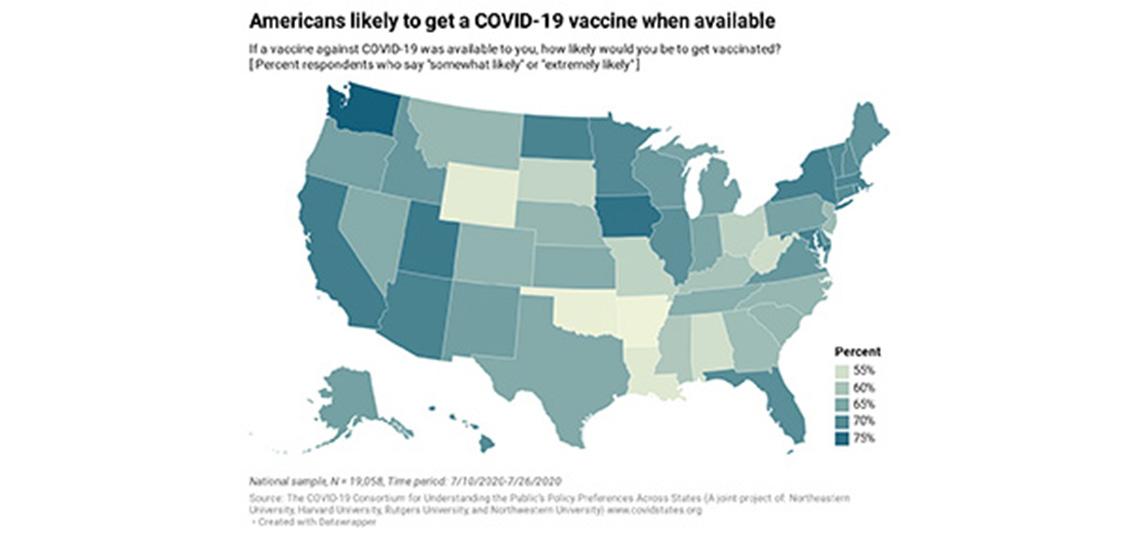
By Megan Schumann, Rutgers University Office of Communications
When a COVID-19 vaccine becomes available, 66 percent of adults are likely to get vaccinated, and have their children vaccinated as well, according to a new nationwide survey led by researchers from Rutgers University–New Brunswick and Northeastern, Harvard and Northwestern Universities.
The likelihood of who will seek a vaccination differed among states and social groups. Influences on their decision-making also varied.
The survey, published by The COVID-19 Consortium for Understanding the Public’s Policy Preferences Across States, indicates that women, African Americans and Republicans are more hesitant about getting a COVID-19 vaccine.
The likelihood of getting vaccinated is below 60 percent in 10 states: Alabama, Arkansas, Louisiana, Mississippi, Missouri, South Dakota, Ohio, Oklahoma, West Virginia and Wyoming. It is greater than 70 percent in 11 other states: Arizona, California, Iowa, Maryland, Massachusetts, Minnesota, North Dakota, New York, Rhode Island, Utah, and Washington, as well as in the District of Columbia.
The researchers say more outreach efforts will be needed for these groups once a vaccine is available.
“Health experts expect that a COVID-19 vaccine will be ready for the public in the first half of next year,” said co-author Katherine Ognyanova, an assistant professor of communication at Rutgers University–New Brunswick’s School of Communication and Information. “But will the public be ready for a vaccine? We may need to reach 70-90 percent immunity among the population to get the disease fully under control and have herd protection for those vulnerable.”
The survey also found that only 58 percent of those without a high school diploma say they plan to get vaccinated, compared to 78 percent of those with at least a bachelor’s degree. Fifty-nine percent of those who earn less than $25,000 anticipate vaccinating, compared to 78 percent of those who earn more than $100,000.
Young adults (18-24) and older adults (65+) are more likely to say they will likely get vaccinated (71 and 73 percent respectively) than those aged 25-44 and 45-64 (63 and 64 percent).
Gaps in the likelihood of seeking vaccination are also based on party affiliation: 62 percent of Republicans say they would be likely to seek vaccination, compared to 75 percent of Democrats.
For those who said they are likely to be vaccinated, 62 percent identify the need to protect themselves and their families as a motivation. Forty-five percent cite protecting people in their community, and 59 percent identify medical professionals' recommendations as a factor. For those who say they were less likely, 33 percent prioritize protecting themselves and their families and 18 percent protecting the community, with 26 percent identifying a medical professional's recommendation as an important consideration.
“In designing public health strategies to increase vaccine acceptance, the desire to protect others or follow medical advice may not be effective motivations for a majority of those not planning to seek vaccination,” said Ognyanova.
The researchers polled 19,058 people across all 50 states plus the District of Columbia from July 10 to July 26.
The COVID-19 Consortium for Understanding the Public’s Policy Preferences Across States is a joint project of Rutgers University, Northeastern University, Harvard University and Northwestern University. The consortium has released nine reports and has charted public opinion related to COVID-19 topics since late April.
For more information, visit: covidstates.org.
Image: Courtesy of the Covid States Project
